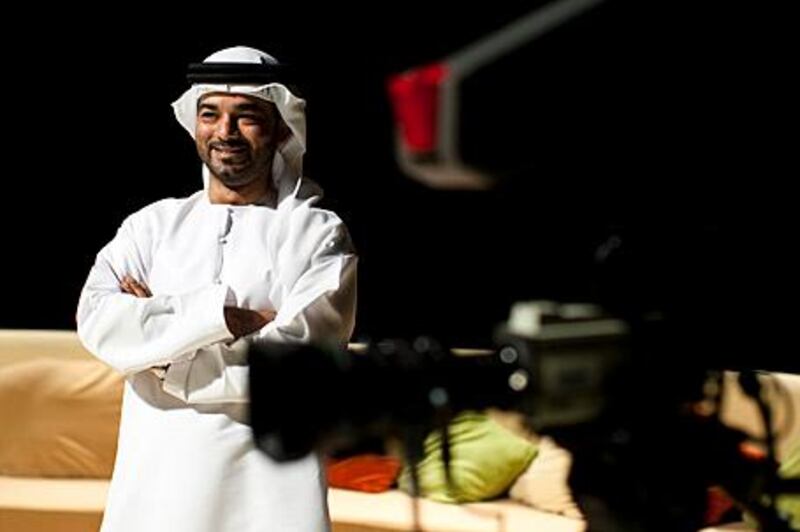ABU DHABI // With high-profile film festivals, a film school and investment vehicles to fund moviemaking, the UAE is as ambitious in cinema as it is in any other industry.
But even before the red-carpet screenings and moviemaking colleges arrived, the country hosted a grass-roots filmmaking culture driven by Emiratis keen to record life in this fast-changing country. One Emirati lecturer and filmmaker has made it his mission to document this fledgling industry's development. Saoud al Mulla, 32, has viewed more than 100 films dating from 1994, many of them entered into contests such as the Emirates Film Competition, which has run since 2002.
But Mr al Mulla, an academic at Abu Dhabi Men's College who has an MA in film and television production from the University of Bristol, is not just recording the history of UAE cinema for fun. He hopes his research will earn him a PhD at the University of Gloucestershire in England. "It's a very, very rare subject," he said. "Every time I tell someone here in the UAE I'm doing it on films they're surprised because it's a very new medium for us in the UAE. "People look on it as entertainment. It would never cross their mind that someone could do a PhD on films."
Nearly all of the early UAE films concentrated on issues of national identity and culture, according to Mr al Mulla. "The national character is represented in these films," he said. "Most are set in the 1960s and 1970s, because that's when the UAE culture was really clear and traditional. "The directors are trying to reinforce their identity. They are telling stories, they are discussing cultural and religious issues."
Cultural issues still feature heavily in UAE films. One of Mr al Mulla's own favourites is Bint Mariam, an award-winning 2008 short film directed by Saeed Salmeen al Murry that tells of a woman's experiences after the death of her much older husband. "The story is very, very strong," Mr al Mulla said. "It touches on cruelty and arranged marriages. It ends up with optimism." Emirati filmmakers are now also making thrillers or comedies that, while often set in the UAE, "imitate Hollywood", Mr al Mulla said. He sees this diversification, which has taken place in parallel with an improvement in the technical standards of filmmaking, as key to local filmmakers achieving greater international recognition.
"There are some films that are thrillers, about crime, people stabbing each other, which really doesn't represent UAE culture at all," he said. "Some of them are horror films. Some of them are comedies." While filmmaking has taken on a higher profile in the UAE through the Middle East and Dubai film festivals, and the opening of a branch of the New York Film Academy in Abu Dhabi, Mr al Mulla pointed to continuing hurdles. In particular, he said, lack of funding has hampered directors keen to produce feature-length movies instead of the short films that have predominated.
"We still lack the expertise in filmmaking. People won't take the risk of funding a film by a local director. I think somebody should take the risk and invest in them." The director of Abu Dhabi Men's College, Dr Simon Jones, is impressed with Mr al Mulla's work, describing him as "a model of the 21st-century academic". "He's committed to his students and a pioneer not only in new areas of technology but in an area of research important in the fostering of Emirati identity," he said.
"The Higher Colleges of Technology have a focus on applied research that drives the economy of the UAE and in investment in its cultural infrastructure, and Saoud can be seen as one of these pioneers. He makes us all proud of him at HCT." Mr al Mulla spent a year in England working full-time on his doctorate, but has returned to the UAE and is juggling research with his role as the acting chair of applied media studies at the men's college. He hopes to complete his PhD in 2011 before publishing a book based on his work.
Mr al Mulla has made films himself, including commercials and a short film for his MA. He is working on two scripts, both in Arabic. "One of them is a comedy and the other is a bit more political and takes place in the UAE and the UK," he said. "It's a bit challenging technically, and it will need a lot of funding."
dbardsley@thenational.ae







